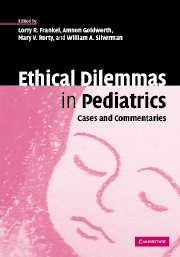Part I - Therapeutic misalliances
Published online by Cambridge University Press: 18 August 2009
Summary
The ideal relationship between physician and patient, or in the pediatric setting, between physician, patient, and parent, is a therapeutic alliance. In this alliance, both parties have a common understanding of the goals of treatment and the means by which to achieve them. The physician's perspective is that of the medical expert who best understands the appropriate means. The parent's perspective is that of an autonomous agent concerned with the well-being of his or her baby as this bears on the interests of the entire family.
The therapeutic alliance, once established, allows the physician to concentrate on meeting an adequate standard of care appropriate to the particular case without the need to justify his or her actions. In addition, it promotes parental trust and confidence in the physician. These important results are not possible when there is a lack of agreement between physician and parent concerning the ends and means of clinical care. Call this lack a therapeutic misalliance.
The three clinical cases that are discussed and commented upon in this section are examples of therapeutic misalliances. The first involves a mother's insistence upon the use of alternative medicine in the treatment of her seriously ill child. The second concerns confusions as to the goals of treatment and a concomitant breakdown in communication between the caregivers and the family. The third is about a mother's deceptive practices and miscommunications concerning her son's illness.
- Type
- Chapter
- Information
- Ethical Dilemmas in PediatricsCases and Commentaries, pp. 9 - 12Publisher: Cambridge University PressPrint publication year: 2005

